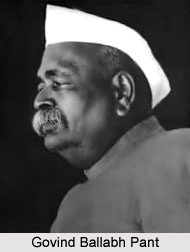 Pandit Govind Ballabh Pant, popularly known as Pandit Pant, was a renowned Indian freedom fighter, Indian statesman and independence activist. He was also one of the most important political leaders from Uttarakhand (earlier known as United Provinces). Govind Ballabh Pant was also one of the leaders of the movement that established Hindi as the official language of the nation. Pandit Pant was honoured with the Bharat Ratna award for his contributions.
Pandit Govind Ballabh Pant, popularly known as Pandit Pant, was a renowned Indian freedom fighter, Indian statesman and independence activist. He was also one of the most important political leaders from Uttarakhand (earlier known as United Provinces). Govind Ballabh Pant was also one of the leaders of the movement that established Hindi as the official language of the nation. Pandit Pant was honoured with the Bharat Ratna award for his contributions.
Early Life of Govind Ballabh Pant
Pandit Govind Ballabh Pant was born on 10 September 1887 in the village of Khoont in Shyahi Devi hills in Almora District. He was born to father Manorath Pant and mother Govindi. After he completed his education, Pant continued his higher studies and acquired a degree in Law. While he worked as a lawyer in Kashipur, Pandit Pant actively participated in the Indian freedom struggle against the rule of the British Empire in India in the year 1914. He supported a village council or parishad in their successful dispute of a law that required the locals to provide free transportation of the luggage of traveling British officials. Pant entered the world of politics in the year 1921and was eventually elected to the Legislative Assembly of the United Provinces of Agra and Oudh.
Govind Ballabh Pant in Freedom Struggle
In the year 1930, Govind Ballabh Pant was arrested by the British Indian Police and was sentenced to imprisonment for many weeks as a result for organizing a Salt March. Later in 1933, he was again arrested and sent to jail and imprisoned for a period of 7 months for participating in a session of the provincial Congress, which was banned at the time. After the ban was rescinded in 1935, Ballabh Pant became a member of the new Legislative Council. During World War II, he acted as the mediator between the groups who supported Mahatma Gandhi`s views the British Government of India in their war effort and the views of Netaji Subash Chandra Bose that sought to take advantage of the situation to drive out the British by any means.
In the year 1934, the Indian National Congress Party culminated its boycott of the legislatures and put up candidates. Govind Ballabh Pant was elected to the Central Legislative Assembly. He won the admiration of the leaders of the Congress Party through his political skills. Eventually Pandit Pant was appointed as the deputy leader of the Congress party in the Assembly.
Pandit Govind Ballabh Pant was arrested by the British Police in 1940 and was sentenced to rigorous imprisonment for his involvement in the organization of the Satyagraha movement. In the year 1942, he was again arrested for signing the Quit India resolution and was jailed for around 3 years in Ahmednagar Fort, along with other prominent members of the Congress Working Committee until March 1945. Later he was released after the requests of Jawaharlal Nehru.
Govind Ballabh Pant as Chief Minister
 The provincial elections were held in the year 1937 due to the Government of India Act 1935. After the Nawab of Chhatari, the leader of National Agriculturist Parties, was invited to establish a minority government on 1st April 1937, the Indian National Congress Party accepted to form the government under Pandit Govind Ballabh Pant who was appointed as the Chief Minister on 17 July 1937. He served office till 1939 when all ministries in Congress resigned.
The provincial elections were held in the year 1937 due to the Government of India Act 1935. After the Nawab of Chhatari, the leader of National Agriculturist Parties, was invited to establish a minority government on 1st April 1937, the Indian National Congress Party accepted to form the government under Pandit Govind Ballabh Pant who was appointed as the Chief Minister on 17 July 1937. He served office till 1939 when all ministries in Congress resigned.
In the year 1945, the new British Labour government ordered new elections to the Provincial legislatures. The Indian National Congress Party won a majority in the elections held in 1946 in the United Provinces. Pandit Pant was again appointed as the Chief Minister and served even after the nation attained independence from the British in the year 1947. He served as the first Chief Minister of the state of Uttar Pradesh in Independent India. During his tenure as the Chief Minister, Pant abolished the zamindari system.
Govind Ballabh Pant as Union Home Minister
Pandit Govind Ballabh Pant or Pandit Pant was appointed as the Union Home Minister of India in the year 1955 and served in the position till 1961. As the Home minister, he re-organised the States along linguistic lines. Pant was also responsible for the establishment of Hindi as an official language of the central government and other Indian states. In the year 1955, Pant was honoured with the Bharat Ratna Award.
Pandit Govind Ballabh Pant died on 7th March 1961, after his health deteriorated and spending several days in a coma.






